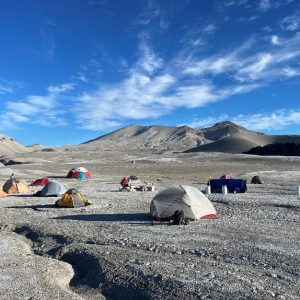Volcanic Hazards, Critical Minerals, and Geology for an Uncertain Future
Presentation by Dr. Joe Biasi, University of Wyoming
October 1st (Tuesday), 6 p.m., Social half-hour; please join us from 5:30-6:00 to enjoy free soft drinks and appetizers before our talk begins!
Live at the Teton County Library & Via Zoom (online)
As the world’s population grows and as countries continue to develop, their need for greater resources and their exposure to natural hazards increases. In part 1 of this talk I’ll cover a major advancement in volcano monitoring that can reduce monitoring costs by up to 4000x. This technique uses measurements of earth’s magnetic field, which are altered by nearby magma. By continually measuring the magnetic field at volcanoes, the movement of magma below the surface can be detected and the signs of an impending eruption can be relayed to authorities. The main advantage of magnetic measurements is that they can be done at dramatically lower costs than traditional techniques, allowing low-income countries with high volcanic hazards to install large monitoring networks for the first time.
In part 2 I’ll talk about my research in Wyoming, which focuses on deposits of critical minerals. These elements (mostly metals) are necessary for modern life or national security, but are often difficult to obtain. This includes lithium, cobalt, rare-earth-elements, platinum, etc. My lab group’s activities are designed to prepare students for careers in this field, which is projected to grow significantly in the next decade. I’ll discuss my numerous strategies to prepare students, including one-of-a-kind courses and fieldwork experiences, all here in Wyoming.


Our camp at Puyehue Volcano in Chile Joe Biasi
Topic: Volcanic Hazards, Critical Minerals, and Geology for an Uncertain Future
Time: Tuesday October 1st, 2024 06:00 PM Mountain Time (US and Canada)
Join Zoom Meeting
https://us02web.zoom.us/j/4555651818?pwd=U09ObDNZOEIyZmRtMEtsdUowQnJqdz09
Meeting ID: 455 565 1818
Passcode: 576063
